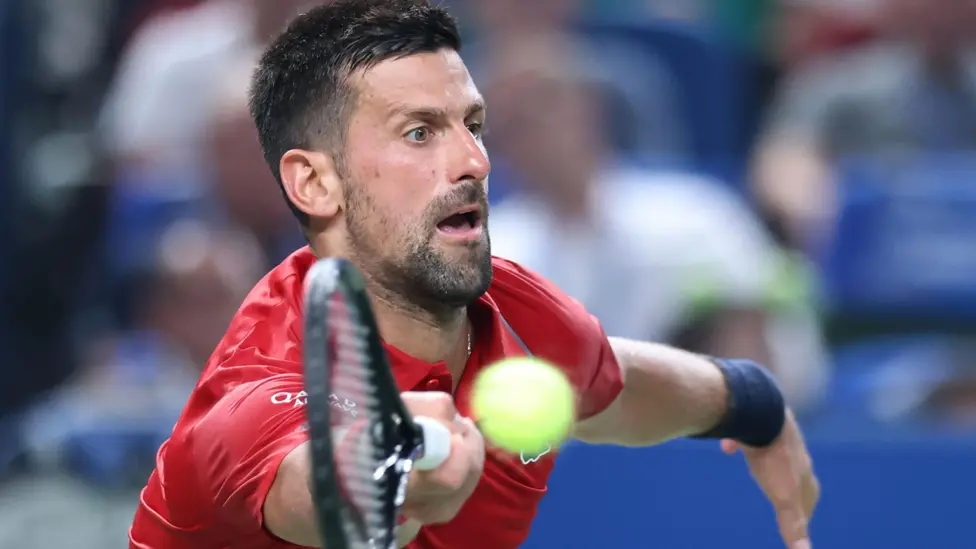Novak Djokovic admitted he “suffered a lot” as he survived a hard-fought second-round clash against Marin Cilic at the Shanghai Masters, securing a 7-6 (7-2), 6-4 victory in one hour and 54 minutes.
The 38-year-old Serb, playing his first tournament since the US Open and his first non-Grand Slam event since May, faced a stern test from the 37-year-old Croatian. The combined age of 75 years and 139 days made this the oldest-ever matchup in an ATP Masters 1000 main draw.
A tense first set
The opening set was a tightly contested affair. Both players held serve consistently, with little to separate them. Djokovic, ranked world number five, eventually edged the tie-break 7-2 to take the lead. The Serb admitted that Cilic had been the better player during much of the set.
“It was a very close match,” Djokovic said. “He was probably the better player for the first set and he didn’t give me time to breathe. I did enjoy it, but I also suffered a lot on the court.”
The match showcased the durability and tactical intelligence of both veterans. Cilic, a former US Open champion, used his experience to control rallies and target Djokovic’s movement, forcing the world number five to dig deep.
Turning point in the second set
The second set proved decisive when Djokovic broke Cilic’s serve in the third game. The Serbian’s powerful and precise serving allowed him to maintain his advantage and gradually gain control of the match. Despite his dominance in the tie-break, Djokovic continued to battle Cilic point for point, demonstrating remarkable resilience.
“I think I dug myself out of trouble with good serving, which obviously makes me happy,” Djokovic added. “I had to fire up all engines to get through this match.”
The victory puts Djokovic into the third round, where he will face German qualifier Yannick Hanfmann, a big-serving player who will test Djokovic’s returning skills and defensive agility.
Other notable results
The tournament also witnessed a surprising result as sixth seed Ben Shelton, recovering from a shoulder injury sustained at the US Open, was ousted by Belgium’s David Goffin, 6-2, 6-4.
Shelton struggled to find his rhythm in the opening set, losing his serve twice, and although he attempted a comeback in the second, an unforced error in the ninth game gave Goffin the advantage he needed. Goffin will now face Canada’s Gabriel Diallo, seeded 31, in the third round.
Meanwhile, world number one Carlos Alcaraz withdrew from the Shanghai Open earlier in the week, citing “some physical issues” after his triumph at the Japan Open. His absence leaves the draw more open and increases opportunities for other top seeds to advance further.
The veteran factor
Djokovic’s performance highlighted the ongoing battle between experience and physical demands in men’s tennis. Both Djokovic and Cilic displayed remarkable conditioning and mental toughness despite their advancing ages. The match emphasized that veteran players can still challenge the best of the younger generation in high-stakes ATP events.
Djokovic, who has won the Shanghai Masters four times, continues to prove his longevity at the top of the sport. His ability to adapt to different opponents and recover under pressure was evident throughout the match, reinforcing why he remains a formidable competitor in any setting.
Looking ahead, Djokovic will need to sustain his level against Hanfmann, whose powerful serves and aggressive baseline play could present unique challenges. However, if Djokovic’s fitness and match awareness continue to hold, he remains well-placed to make another deep run in Shanghai.
For Cilic, the loss is another reminder of the fine margins in professional tennis, particularly in the twilight years of a career. Nonetheless, the match served as a showcase for the enduring quality of both players, who combined for almost two hours of intense, high-quality tennis.
As the Shanghai Masters progresses, fans will watch keenly to see whether Djokovic can convert his early-round form into a potential title challenge, while the tournament continues to offer compelling clashes between experienced veterans and emerging talents.



